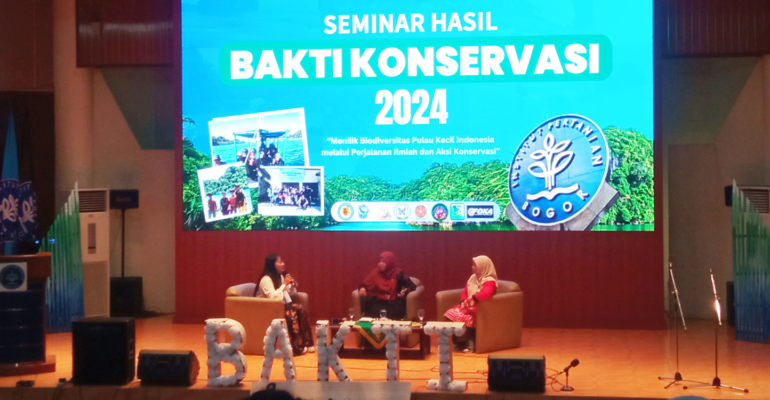Navigating the Hidden Potential of Indonesian Biodiversity through the Seminar of Conservation Bakti Results of Himakova IPB University

The Student Association of Forest Resource Conservation and Ecotourism (Himakova) IPB University held a Bakti Konservasi Seminar at Andi Hakim Nasoetion Auditorium, IPB Dramaga Campus on 8 June 2024. This activity is the culmination of Himakova’s flagship work programme, Environmental Conservation Study (Surili), in collaboration with the East Java Natural Resources Conservation Centre.
According to the chief executive of the seminar, Yildiray Haidar Jabbar, this activity aims to publicise the results of the Surili 2023 expedition which was held in Sempu Island Nature Reserve in December 2023.
“We want to show the characteristics of biodiversity in small islands and review the role of small islands in conservation. Hopefully, the positive messages contained in this activity can benefit us all and foster the spirit of conservation,” he said.
This activity was divided into two sessions, the first session raised the theme “Conservation of Indonesia’s Coastal Areas and Small Islands” by presenting resource person Badi’ah S.Si, M.Si, as Head of the Sub Directorate of Species and Genetic Preservation of the Ministry of Environment and Forestry (KLHK).
Badi’ah, S.Si, M.Si emphasised the importance of coastal and small island areas in Indonesia in overcoming biodiversity loss. “Indonesia is an archipelago, which causes small islands to become geographically isolated, resulting in endemic island animals,” she explained.
He added that the isolated condition resulted in the evolution of unique species that are only found in Indonesia, such as Komodo dragons that are only found on Komodo Island and surrounding islands, bawean wart pigs on Bawean Island and Maratua stone magpies on Maratua Islands.
“To overcome some of these problems, the younger generation as agents of change must actively participate in coastal biodiversity conservation. This is because the problem is increasingly complex so that it requires cross-border conservation efforts insitu and exitu so that the continuity of biodiversity can be maintained,” said Badi’ah.
The second session continued with the theme “Looking at the Potential of Biodiversity, Ecotourism, and Karst Area of Sempu Island Nature Reserve” by presenting data from the Surili expedition in Sempu Island Nature Reserve by Fajar Rizky Tri Wahyudi, a student of Forest Resource Conservation and Ecotourism (KSHE) IPB University.
“Sempu Island Nature Reserve still has high biodiversity and karst so it has great potential to be utilised as ecotourism. Hopefully the data obtained can be the most up-to-date data that will help managers to develop conservation programmes in the future,” he said. (*/Lp) (IAAS/RSL)



